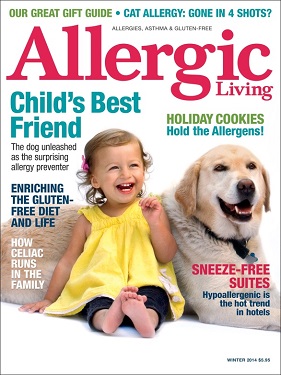 Owning a dog may protect against the development of allergies if exposure begins in the womb to the first year of life, according to an overview of relevant research presented in the Winter 2014 issue of Allergic Living magazine.
Owning a dog may protect against the development of allergies if exposure begins in the womb to the first year of life, according to an overview of relevant research presented in the Winter 2014 issue of Allergic Living magazine.
The article “Child’s Best Friend” highlights research conducted between 1999 and 2012 investigating the impact of pets on a child’s risk of developing allergies. AllerGen’s Canadian Healthy Infant Longitudinal Development (CHILD) Study — a birth cohort study following 3,330 Canadian infants from pre-birth to age five — was featured as an important study looking at the connection between allergies and early-life environmental exposures, such as pets, among other factors.
Dr. Malcolm Sears, Research Leader for the CHILD Study, and Dr. James Scott, one of the study’s co-investigators, were both interviewed by Allergic Living. Early data from a small subgroup of CHILD Study participants has revealed that household pets and siblings increase an infant’s exposure to environmental microbes and influence the makeup of the gut microbiota, which may have implications for the development of allergies.
Read the study “Infant gut microbiota and the hygiene hypothesis of allergic disease: impact of household pets and siblings on microbiota composition and diversity,” co-authored by Drs Sears and Scott.
